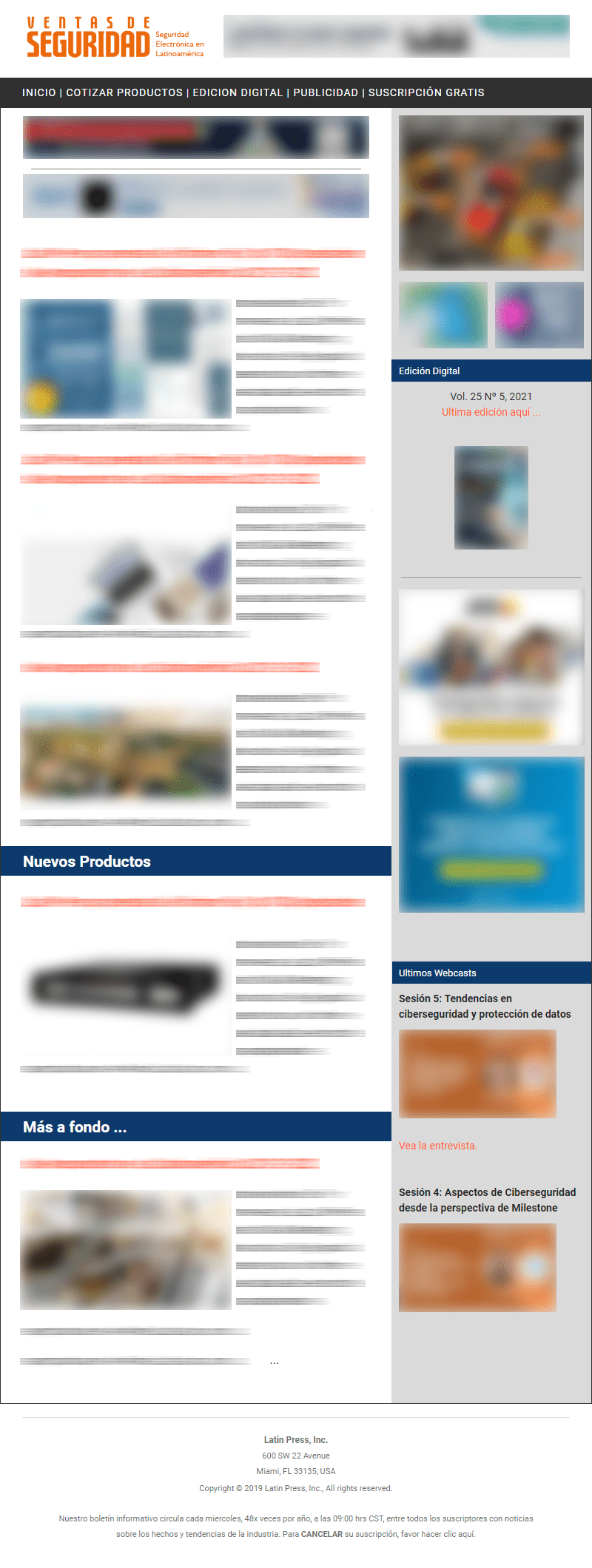By Julián Arcila
To understand the commercial environment of the region, it is important to know each of the links that make up the distribution chain of security technology in Latin America. One of these links, which has gained strength over the last few years, are the representatives of brands, an actor that although it is increasingly present in the different commercial scenarios of the industry, is not as well known as it should be.
This article constitutes an interview that VENTAS DE SEGURIDAD did with three of the companies that develop this function in the region, all with the aim of generating greater clarity for the market and knowing what can and cannot be expected from one of these companies. Glenn Patricio (LRG International), Walter Hawrys (IWinc), and Guillermo Palma (Security Solutions) also provided an analysis of the economic and commercial situation that the region is experiencing and how this type of company faces it.
Making a difference
One of the misconceptions that are traditionally woven around the concept of the brand representative is the one that associates it with a distributor, which is a huge mistake. First of all, it is to understand that a representative of firms does not have stock (they do not have inventory), but that they are an extension of the manufacturers in a region in which they do not have a physical presence.
Glenn Patricio of LRG International said that the primary function of a representative is to sell and support their customers in an assigned territory to establish the right sales channels for their manufacturers. "Simply put, a representative should be the face of their manufacturer in the market," he explained.
Walter Hawrys of IWinc complemented the above, adding that technically a representative is the extension of a factory's sales department, but beyond that, he is a spokesperson for the brand to its customers while being the vehicle that allows the manufacturer to know the needs of its buyers.
But there is a third element that is fundamental and lies in the work of market development that representatives can do for their brands, a factor that has made them key players in the security sector. Guillermo Palma, from Security Solutions, explained that this work is made easier for representatives, as they know the cultures and languages of the territories in which they work. This official provided a key element to understand the relationship between these actors and distributors. "For the different market channels such as the distributor, integrator and end user is to get them interested in the products through various local services such as training and technical support, among others. The representative is the communication bridge between the manufacturer and the market," he said.
But this last point is quite complex, because for many people it is difficult to understand where the differentiating line is established between these representatives and other companies that develop some similar functions such as training and processes of approach to end users.
Faced with this, Patricio makes a very clear differentiation. "We are not distributors; we don't buy and sell solutions. We are that direct sales channel from the factory to the consumer, we sell both to the distribution and integration channels in the Latin market. We do not sell directly to the end user. However, we visited it to specify the manufacturer's products," he said. Additionally, he commented that the popularity that these firms are currently enjoying is due to the fact that working through this channel is less expensive in direct proportion to sales within a niche. {mospagebreak}
And it is that perhaps the great advantage that manufacturers have when they resort to a representative is that they know exactly the value that a sale would have, which is higher if you have a person directly hired; all of this becomes more costly when there is no certainty that you will succeed in the process of promoting a brand in a specific territory, Hawrys said.
Another important aspect of the role of representatives is that it alone favors a vital aspect of business today such as the specialization of work. According to Guillermo Palma, a representative facilitates the fact that a manufacturer focuses on the development of new products, while the first one is in charge of the administrative part and sales. Palma explained that at present the business scheme has changed and that previously for a distributor it was possible to market several brands and at the same time do the promotion; with the competition that exists these days, in addition to the massive entry of oriental products of low quality but of great margin of profits, the distributors have abandoned fundamental elements for the brands and that in the last are those that favor the promotion of the brand, such as technical support, the accompaniment in the projects, in addition to others.
The difficulties of the "reps"
But, it's definitely not all benefits for representatives. This type of companies must constantly face pitfalls of multiple characteristics, but that ultimately relate to the same character of the representative companies, because not all people understand that they are not on one shore or the other, that is, they are neither the manufacturer nor are they distributors. However, sometimes they can face difficulties typical of a market that despite its size still has many companies aimed at production in an environment that requires a marketing orientation.
It is precisely in this last aspect where the "reps" have found one of the biggest obstacles, because on many occasions they have to open the market for firms that have not taken many steps to relate to the Latin market.
For LRG, one of its biggest setbacks has been the limited availability of technical materials in Portuguese, for Brazil, and in Spanish for the rest of the continent. In Glenn Patricio's opinion, in order to easily penetrate markets, it is essential that manuals and other information formats are in local languages; this is in addition to other key aspects to gain in promotion, such as participation in exhibitions and increases in resources for marketing.
With Glenn's assessments, Palma Camacho coincided, for whom also the little support sometimes provided by manufacturers becomes an obstacle for business, which is also aggravated by the resistance observed in the face of the change in marketing channels. He added that "some manufacturers find it difficult to offer local demonstration equipment as well as local service for repair in and out of the warranty period, making it difficult to boost sales; on the other hand, if the different marketing channels are not updated in new products and technologies, they tend to stay to work with the teams they already know and therefore slow down the sales of new products and technologies."
Also a drawback is the fact that representatives sometimes have to perform functions as diverse as technical calls and collections, in addition to those they perform in marketing and sales; however, this factor is part of the confusion generated by the very role of the "reps" in the region, as Hawrys indicated. {mospagebreak}
Strategies in difficult situations
It is not a secret that the electronic security sector is permeated by situations that are not the most appropriate and that without being the denominator factor do not stop bothering those who do business "as the law commands". Thus, representatives may also be at times compromised or harmed by situations related to disloyalty in the market and the decrease that this element has on the credibility of those who try to do business under unconventional schemes.
For this reason, this media consulted the three professionals cited to know the perception they have of the phenomena that affect the environment of security businesses, but also how they look in the middle of this panorama.
Glenn Patricio suggests that reps shouldn't get out of focus because of the external factors that have been mentioned, but instead says that the role of a "rep" is to be value-added and help their customers design, understand and practically train their customers to make good sales. "Price is incredibly important in Latin America; however, providing value-added services attracts new customers and fosters the generation of commercial relationships in the region," he said.
For Walter, the problem of unfair competition is not unique to Latin America, but is a global problem. He assured that the role of each brand is to show why it is the best solution. "Sometimes the customer makes the decision to acquire a good or service based on price. It's amazing how many times I've seen the saying 'cheap is expensive' become true. As for the non-compliance with the promised characteristics, this is something that does not only affect the security sector," he said.
Guillermo Palma, for his part, believes that in the environment described (unfair competition, sale of solutions that do not meet the promised specifications or sale of solutions that do not have the technical infrastructure to function properly in the region), the representative should be an advisor who understands the needs of the client and recommends the best solutions to meet them; the above generates good relationships of trust, which is what in the end weighs.
Where is it easier and where more difficult?
One of the situations that has prevented Latin America from developing economically is the dependence between financial growth and the political moment that a nation may be living in a given era. This phenomenon, which has nevertheless subsided in the last five years, must be added to the difficulty of the region to become a territory of free trade or open to commercial exchange with other regions of the planet.
For the "reps" such a situation, even if they do not handle stock, is complicated, since the import facilities determine the sales possibilities for one brand or another according to their country of origin.
Glenn Patricio said that countries such as Peru, Chile, Mexico and Costa Rica are nations where sales have grown significantly, thanks to free trade agreements or commercial exchange programs with the countries of origin of the merchandise they represent, which comes from Asia and the United States, among others. Territories such as Brazil and Argentina, among many others, still have difficult customs and trade policies, as import costs are very high. "A good market study conducted by the representatives would indicate whether the solutions they represent could be inserted into the local chains taking into account an increase in prices due to import tariffs," he said.
To solve the customs difficulties, Palma explained that many manufacturers have chosen to maintain local stock , but this becomes a risk, as they must develop a long-term financing program. On the other hand, local distributors who already know their market have begun to maintain minimum and maximum stocks, to ensure a quick return on investment. However, the ball returns to the field of manufacturers and in this sense many of them have understood the new times and are handling short delivery periods. "Maintaining a stock in their warehouses and shortening manufacturing times only depend on transport times and the one that takes a product to go through the corresponding customs," he said. {mospagebreak}
But one thing that is also true is that the situation has improved markedly in recent years, as Hawrys indicated. "Bureaucracy is shrinking in many countries. Although there is an advantage to having immediate delivery inventory, many factories are producing products with the JIT (Just in Time) philosophy, which reduces delivery time. However, it must be recognized that some products may take longer to manufacture. Part of the success of the merchant in Latin America is to identify which products should be kept in inventory," he said.
Opinion on distribution channels
Something that does not remain the slightest doubt is that the security industry is experiencing enormous transformations in commercial optics, as the entry of an increasing number of players, the multiplicity of functions that execute some of them and the concern for the price, among other factors, they are elements that modify a market and end up inserting it into the vicious circle in which it is not changed because the supply conditions and it does not vary because the market asks for it.
The editor chose to consult the experts on the outlook they see in the short term for the distribution chain in this sector.
One of the phenomena that are being seen and will continue to be observed is the gradual strengthening of local distribution channels. "LRG sells 80% of our manufacturers' products in the Latin American distribution chain. Local distributors will end up getting stronger because it is becoming increasingly difficult for small installation companies to import. The distributor imports by volume and its costs are lower; the great advantage offered by these companies is to maintain a permanent available inventory for their marketers; provide their sub-distributors with a warehouse where the stock is stored instead of waiting for them to invest their money in making purchases before securing the sale," Patricio said.
Guillermo Palma sees difficult situations for the Latin distribution chain, basically derived from the difficulties and high taxes that a company must pay in order to legally import CCTV equipment. However, it considers that distributors are fundamental to the chain and that selling through integrators is not appropriate. Another situation that will arise more frequently is the market division produced by distributors focused on selling Asian solutions, to increase their profit margins, and integrators focused on designing for medium and large markets.
But Walter believes that there is room for all actors and their characteristics, in addition to the market gradually adapting to this reality. "There are wholesalers in Latin America and Miami, each with its own added values. There are also integrators with their team of engineers who specify products in important projects. You have to recognize the attributes of each one and give them access to the right solution," he said.
These characters, which will surely be heard of more frequently in the coming years, predict a generalized growth of the market thanks to the influence of insecurity in different niches such as banks, offices, residences, industries, shops and airports, among others.
Society is adopting the culture of security and this will surely open the space for companies such as LRG, IWinc and Security Solutions, to remain in force, as they undoubtedly have an arduous task of developing a market for their brands, based on a deep knowledge they have of the Latin American territory.
*To contact these experts write to [email protected] , [email protected] and [email protected]

























Leave your comment